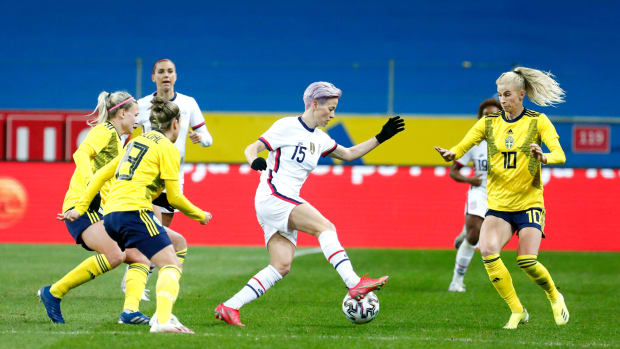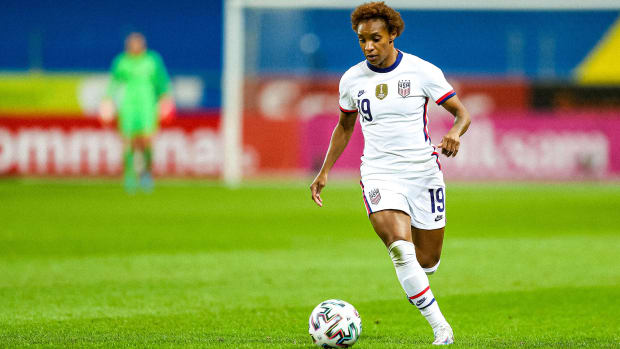A date with France will bring back some not-so-fond memories for the USWNT days after an uncharacteristic performance nearly cost the team its unbeaten streak.
Most major tournament cycles for the U.S. women's national team follow a familiar script: Play in a number of tune-up friendlies and tournaments. Win handily, for the most part. Endure a close call or defeat that all tout as a valuable and needed learning experience.
Three months before the Olympics, and headed to the site of their last defeat, the U.S. women are essentially following that to a T.
Saturday's 1–1 draw at Sweden was a wake-up call and the first non-win of the 17-game Vlatko Andonovski era. Although the U.S.'s unbeaten streak was extended to 38 in all thanks to Megan Rapinoe's late penalty, the performance wasn't up to the U.S.'s high standard, and that's not something from which anyone involved is shying away."I think that this is something that is very good for us," Andonovski said following the Sweden draw. "In fact, that's why we came here. We came here to play good teams. We came to Europe to play opponents to some extent get exposed to different tactics, high-level tactics, organized teams, and to try to overcome all of that. And if not right on the spot or in this game, hopefully be able to prepare for the Olympics and overcome as the Olympics come.
"If we play the way we played today, that's not good enough. It's a good learning opportunity for us to get better."

U.S. star Crystal Dunn echoed those sentiments Monday, on the eve of another match that will challenge the U.S. unlike the majority of the team's friendlies: a showdown vs. European power and third-ranked France.
"Sweden was not our best performance," Dunn said. "The team understands that. We have such high standards for ourselves.
"We need to go through these moments. We need to embrace the challenges we're going to face going into the Olympic Games. The team's in great spirits about it."
France could well provide more of those moments. It is the last team to beat the U.S., doing so in a January 2019 friendly in Le Havre. The two sides return to Stade Océane, which served as the last wake-up call that preceded a U.S. run to another major title. After the U.S. was forced on its back foot for most of that 3–1 defeat, it rebounded to defeat France on the Women's World Cup stage, eliminating the hosts in the quarterfinals with a 2–1 win that catapulted the Americans to a fourth world championship.
France is without a number of star players this time around, with Wendie Renard, Griedge Mbock, Sakina Karchaoui, Amandine Henry, Amel Majri and Delphine Cascarino all ruled out following a COVID-19 outbreak at Lyon. That outbreak also cost rising U.S. star Catarina Macario a place on the U.S. squad.
Just as this match represents symbolism for the U.S.'s last loss, it does for France, too. Les Bleues' last defeat was that quarterfinal date in June 2019, and they've gone 16 unbeaten since—including an impressive 3–1 win over England last Friday.
"I watched the game back against England, and what I see is still a large group of talented players," Dunn said. "France has a really deep player pool, and the players we're going to face tomorrow are going to throw many challenges at us. They're talented, they're technical and they're very dynamic."

Dunn was lauded for how she held up in the face of France's right-flank attacks in that World Cup matchup, and she'll be called upon again despite the squad rotation that was forced upon Corinne Diacre. She's quite aware of the improvement needed from Saturday's effort to ensure that the unbeaten streak continues.
"In the Sweden game, we just weren't good enough," she said. "There were balls that we didn't connect that we know we could. Once your technical ability isn't really there, it makes the game that much harder."
The draw vs. Sweden wasn't just the first non-win for Andonovski, but Lina Hurtig's first-half goal in it marked the first deficit he'd faced as a U.S. coach. That moment wasn't lost on him as he reflected on the result.
"We're talking about a team that's not used to playing from behind," said Andonovski, who rued his team's unforced errors and called the Sweden game a "learning experience for me, too."
"I needed to know, to think about adjustments," he continued. "The fact that we were able to overcome that and score a goal and almost overcome it completely and gain advantage, I thought that was great. It shows we're capable of making things happen. I just hope we don't find ourselves often or at all in that situation.
"We had to change things. We discussed a lot what is the next step. It's one thing to prepare in the office or the locker room. ... I'm glad we had something in mind and we were able to execute it well.
"I don't wake up in the morning thinking, 'I wish we don't do well so it'll be good for us.' We were exposed to something we hadn't seen before. It was good for us to see that and give us a chance to overcome right on the spot, but also to work on it or at least address it going forward. [It's an] overall good experience. That's why we came here. We play the best teams in the world. It's not going to be easy."
While Saturday's result was atypical for the U.S., it wasn't at its full-strength capacity, either. Center back Abby Dahlkemper did not play against Sweden, but Andonovski indicated that she'll be fit to play on Tuesday. Her Man City teammate, Sam Mewis, didn't start vs. Sweden, but she's in contention to feature from the beginning vs. France. Regardless of who plays, with time and opportunities to be tested dwindling before the Olympics—where France will not be competing, but Sweden, which eliminated the U.S. from Rio 2016, will—this trip to Europe has reinforced one very clear reality for a team that's accustomed to being the best in the world.
"If we're not at our best, we're not going to win," Dunn said.
For more women's soccer coverage:

0 Comments:
Post a Comment